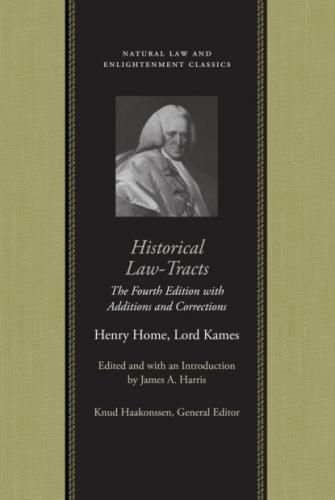[print edition page i]
HISTORICAL LAW-TRACTS
[print edition page ii]
NATURAL LAW AND
ENLIGHTENMENT CLASSICS
Knud Haakonssen
General Editor
[print edition page iii]
Henry Home, Lord Kames
[print edition page iv]
[print edition page v]
[print edition page vi]
This book is published by Liberty Fund, Inc., a foundation established to encourage study of the ideal of a society of free and responsible individuals.
The cuneiform inscription that serves as our logo and as a design element in Liberty Fund books is the earliest-known written appearance of the word “freedom” (amagi), or “liberty.” It is taken from a clay document written about 2300 B.C. in the Sumerian city-state of Lagash.
Introduction, editorial apparatus, and index © 2019 by Liberty Fund, Inc.
Frontispiece and cover (detail): Portrait of Henry Home, Lord Kames, by David Martin. Reproduced with permission of the National Galleries of Scotland.
This eBook edition published in 2019.
eBook ISBNs:
978-1-61487-282-5
978-1-61487-658-8
[print edition page vii]
CONTENTS
TRACT II. Promises and Covenants
TRACT IV. Securities upon land for payment of debt
TRACT VI. Regalities, and the privilege of Repledging
TRACT X. Execution against moveables and land for payment of debt
TRACT XI. Personal Execution for payment of debt
TRACT XII. Execution for obtaining payment after the death of the debtor
[print edition page viii]
TRACT XIII. Limited and universal Representation of Heirs
1. Form of a letter of Slaines
2. Copy of a seisin, which proves, that the Jus Retractus was the law of Scotland in the fifteenth century
3. Copies of two Rent charges:
1. Bond Sir Simon Lockhart of Ley, to William of Lindsay rector of the church of Ayr, for an annualrent of L. 10 Sterling out of the lands of Ley, anno 1323
2. Bond by James of Douglas Lord of Balvany
4. Old style of letters of Poinding the Ground, founded on the infeftment without a previous decree
5. Tax granted by the parliament to Robert I. for his life
6. Lord Lile’s trial
7. Carta Confirmationis Gilberti Menzeis
8. Act of Warding
9. Letters of Four Forms
The executions written on the back
Notes of Letters of Four Forms
10. Carta Ricardi Kine
11. Charter of Apprising
[print edition page ix]
When he published Historical Law-Tracts in 1758, Henry Home was 62.1 He had been elevated to the Court of Session, and had assumed the title Lord Kames, six years previously, in February 1752. Since its creation in 1532 the Court of Session had been the supreme civil court in Scotland. As Kames explains in the tract “Of Courts,” it “hath an original jurisdiction in matters of property, and in every thing that comes under the notion of pecuniary interest” (226).2 Elevation to the Court was the culmination of a legal career that had begun when Kames was called to the bar in 1723.
[print edition page x]
One thing that had helped to advance that career was the remarkable energy Kames devoted to a series of books intended to give order to two centuries of the Court’s decisions. The first of these was Remarkable Decisions of the Court of Session, from 1716 to 1728 (1728), intended as a supplement to Stair’s Institutions of the
